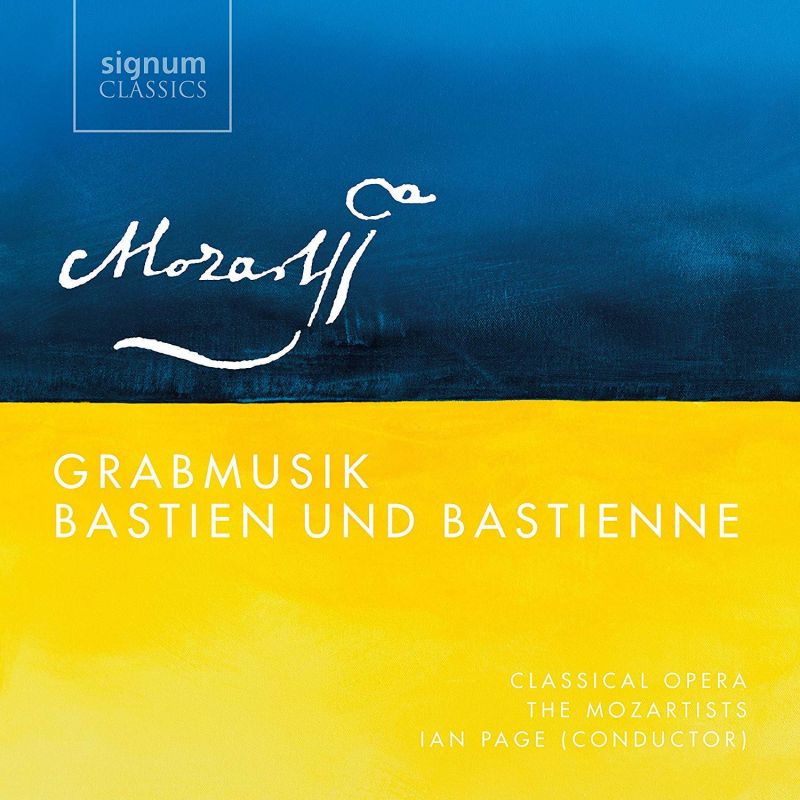MOZART Bastien und Bastienne. Grabmusik (Page)
View record and artist detailsRecord and Artist Details
Composer or Director: Wolfgang Amadeus Mozart
Genre:
Opera
Label: Signum
Magazine Review Date: AW18
Media Format: CD or Download
Media Runtime: 66
Mastering:
DDD
Catalogue Number: SIGCD547

Tracks:
| Composition | Artist Credit |
|---|---|
| Bastien und Bastienne |
Wolfgang Amadeus Mozart, Composer
Alessandro Fisher, Bastien, Tenor Anna Lucia Richter, Bastienne, Soprano Ian Page, Conductor Jacques Imbrailo, Die Seele, Baritone The Mozartists Wolfgang Amadeus Mozart, Composer |
| Grabmusik |
Wolfgang Amadeus Mozart, Composer
Anna Lucia Richter, Der Engel, Soprano Darren Jeffery, Colas, Bass-baritone Ian Page, Conductor The Mozartists Wolfgang Amadeus Mozart, Composer |
Author: Richard Lawrence
The opening aria is astonishing: a baroque ‘rage’ number in D major, with a D minor middle section that moves via E flat to a cadence in E minor. There are staccato high notes and vigorous triplets, all of which Jacques Imbrailo dispatches admirably. With its dramatic pauses and G minor tonality, the Angel’s aria has a touch of Sturm und Drang (Haydn’s Symphony No 39 in the same key is exactly contemporary). The horns are silent but Mozart enriches the texture with divided violas. In the duet, the Soul’s repeated cries of ‘Ah, what have I done?’ finally give way to acceptance and resolution. The recitative and chorus that Mozart added later are omitted.
Anna Lucia Richter, the Angel, turns up again as Bastienne in Mozart’s little Singspiel. Based on a parody of Rousseau’s Le devin du village, it was commissioned by Dr Mesmer, a family friend, at whose house in Vienna it was performed in 1768. The story is a simple one. Bastienne, a shepherdess, is grieved that her lover has abandoned her for a noblewoman. Colas, practising as a sorcerer, assures her of Bastien’s love but advises her to feign rejection when her erring swain returns. After some hocus-pocus and Bastien’s vowing to kill himself, the lovers are reconciled. The music is simple, too, looking forward here and there to Blonde in Die Entführung. Bastien’s ‘Meiner Liebsten schöne Wangen’ is a graceful minuet, flutes replacing the oboes. Colas casts his spells in a violent C minor outburst; it is repeated in the Appendix with different nonsense words.
It only remains to add that Ian Page and his crack team – singers and players – are clearly having a lot of fun, which comes across in this excellent recording. It’s a treat to experience these faint anticipations of greatness in such winning performances.
Discover the world's largest classical music catalogue with Presto Music.

Gramophone Digital Club
- Digital Edition
- Digital Archive
- Reviews Database
- Full website access
From £8.75 / month
Subscribe
Gramophone Full Club
- Print Edition
- Digital Edition
- Digital Archive
- Reviews Database
- Full website access
From £11.00 / month
Subscribe
If you are a library, university or other organisation that would be interested in an institutional subscription to Gramophone please click here for further information.




